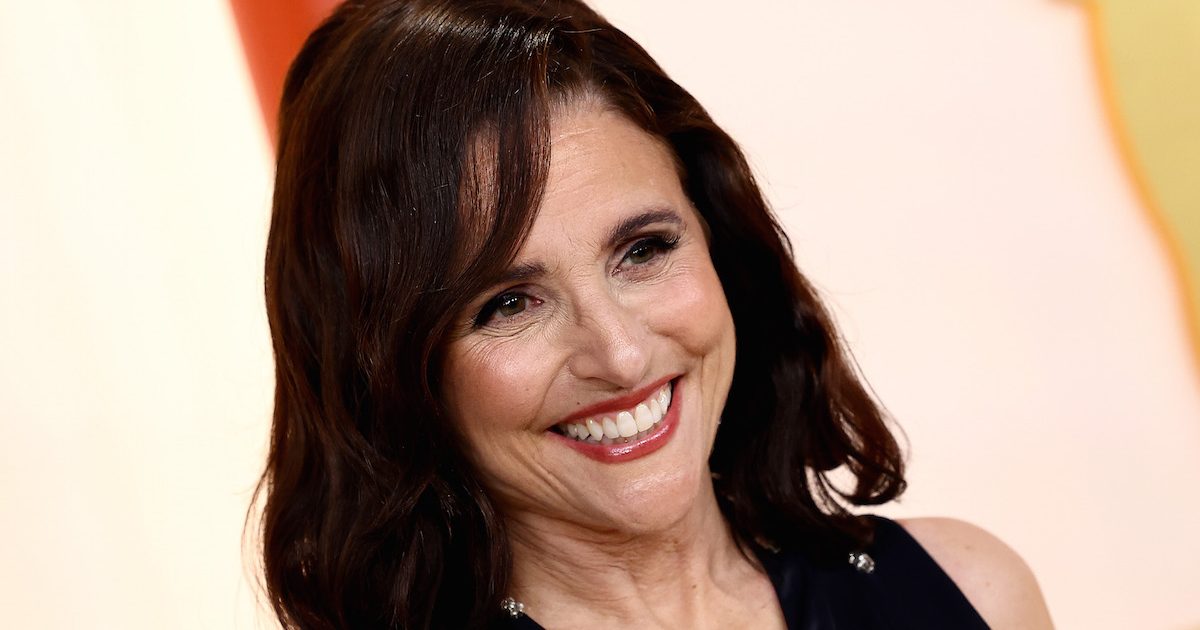Life After Cancer
- Comedian and actress Julia Louis-Dreyfus appears to be thriving and aging gracefully after battling stage 2 breast cancer.
- The 62-year-old loving mother to two sons, 30-year-old Henry, and 26-year-old Charlie, was recently featured in People magazine’s latest cover story, where she opened up about her connection with a new character she plays, the joy she gets from being a mom, and how she’s aging with grace and acceptance.
- Thankfully, after undergoing treatment for breast cancerwhich entailed six rounds of chemotherapy and a double mastectomyshe announced she was cancer-free in October 2018.
- That process of pushing oneself to try new things, which Louis-Dreyfus seems to be doing, is one of the “three wellsprings of vitality,” according to Dr. Samantha Boardman.
- These “three wellsprings of vitality” can help someone develop the strength needed to survive or manage a difficult situation.
The award-winning actress, known for her roles in “Seinfeld” and “Veep,” was featured in People magazine’s latest cover story, where she opened up about her connection with the character (Beth) she plays in the new comedy ” You Hurt My Feelings,” the joy she gets from being a mom, and how she’s aging with grace and acceptance.
Read MoreLouis-Dreyfus, who continues to exude confidence throughout the years, also admitted that she strives to continue working with “vitality and energy,” which she is confident she still has, noting that she might as well “use it.”
View this post on Instagram
In regard to her sons and being a mom, Louis-Dreyfus explained, “I'm so grateful they're out in the world and functioning, but it does require relinquishing a lot of control.”
Louis-Dreyfus is a loving mother to two sons, 30-year-old Henry, and 26-year-old Charlie.
“It's a slow process, but it's equally joyful when a new dynamic comes into play as they become adults,” she continued. “I love hearing their opinions and watching what they do.”
More On Breast Cancer
- Introduction to Early-Stage Breast Cancer
- What are the Treatment Options for Late-Stage Breast Cancer?
- For Breast Reconstruction After Mastectomy, Women May Choose ‘Now,’ ‘Later,’ or ‘Never’
- Is a Preventative Mastectomy Right for Me?
- Should I Have a Lumpectomy or Mastectomy?
- 5 Things That Do Not Cause Breast Cancer, Because Facts Matter
As for how she relates to her character Beth in the new comedy-drama film, she said, “I have young adult sons like my character does in the movie, but I still think of them still as my boys. And maybe that’s not a good thing, but they’re still my baby men and always will be.”

Louis-Dreyfus’ zest for life and being a mom comes as the actress is now four years cancer free, following her stage 2 breast cancer diagnosis in 2017.
Julia Louis-Dreyfus’ Cancer Battle
After Julia Louis-Dreyfus received her cancer diagnosis, she shared the news publicly on her social media channels to an outpouring of support.
Just when you thought… pic.twitter.com/SbtYChwiEj
— Julia Louis-Dreyfus (@OfficialJLD) September 28, 2017
“1 in 8 women get breast cancer. Today, I'm the one," she wrote in her tweet. “The good news is that I have the most glorious group of supportive and caring family and friends, and fantastic insurance through my union.”
“The bad news is that not all women are so lucky, so let's fight all cancers and make universal health care a reality,” her tweet continued.
Understanding Your Breast Cancer Diagnosis
Thankfully, after undergoing treatmentwhich entailed six rounds of chemotherapy and a double mastectomyshe announced she was cancer-free in October 2018.
Since then, she's been working on a lot of projects and taking in all the beautiful moments of life, including all that comes with aging.
Back in 2018, the long-time actress turned cancer warrior told People, “I got diagnosed with cancer, and I powered through it. I came out the other side…I'm grateful for all of it.”
Stage 2 Breast Cancer: What Is It?
To get a better idea of what cancer diagnosis Julia Louis-Dreyfus dealt with, it's important to understand what ‘stage’ means for breast cancer patients.
SurvivorNetTV Presents: ‘Resilient’ Never Sell Yourself Short, You're Stronger Than You Know
“Stage really refers to how big a tumor is and how many lymph nodes are involved,” Dr. Elizabeth Comen, a medical oncologist at Memorial Sloan Kettering Cancer Center, told SurvivorNet in an earlier interview.
“When a woman has stage 2 breast cancer, it means that the tumor's probably bigger than 2 cm and/or she has lymph nodes involved,” Dr. Comen said.
“And if she has lymph nodes involved, she probably doesn't have that many lymph nodes involved. Because if you have more lymph nodes, like 10, 11, 12, then that might be referred to as Stage 3 cancer.”
Resilience After Cancer
Challenging oneself can certainly help people cancer survivors, or those facing cancer, chronic disease, or other problems to develop resilience, which is an essential coping tool.
That process of pushing oneself to try new things is one of the “three wellsprings of vitality,” according to Dr. Samantha Boardman. The other two are connecting with others and contributing to the lives of people around you.
Mental Health Understanding the Three Wellsprings of Vitality
Dr. Boardman explains, “Those are the cores of vitality, and the core pathways to enhance your everyday resilience.”
These three pathways can help someone develop the strength needed to survive or manage a difficult situation, but they all stem from having a positive outlook.
Dr. Zuri Murrell, an oncologist at Cedars-Sinai Medical Center, previously spoke with SurvivorNet about the role of a positive outlook on the survival rates of patients battling illness.
“I'm pretty good at telling what kind of patient are going to still have this attitude and probably going to live the longest, even with bad, bad disease,” Dr. Murrell said. “And those are patients who, they have gratitude in life.”
Questions to Ask Your Doctor
- How can I go about improving my outlook/mental health?
- Are there any activities I can do to encourage positive feelings?
- When should I seek other interventions if I'm still struggling?
- How can seeking these connections help me in my day-to-day life?
SurvivorNetTV Presents: ‘Radical Age’ A Story of Seniors Defying Expectations
Contributing: SurvivorNet Staff
Learn more about SurvivorNet's rigorous medical review process.


